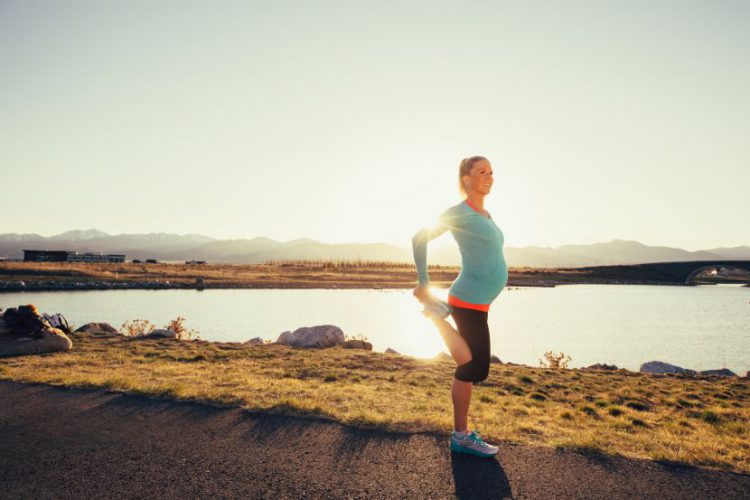
Can you run while pregnant?

It’s important to know that physical exercise, during and after pregnancy, provides undeniable health benefits to the mother. The American College of Obstetricians and Gynecologists[1] recommends that women in good health and in low-risk pregnancies[2] get 20-30 minutes of moderate physical activity every day. If a woman is already active before pregnancy, she can continue her activities at a similar level, including running.
If, however, she is more sedentary, it’s recommended that she wait until the 2nd trimester to begin moving, and to choose a less intense activity, like walking or swimming.
In a study involving 72 women who ran regularly througout their pregnancies, 38% of whom still ran during the 3rd trimester, running had no adverse effects on post-partum pelvic health compared to sedentary women. The same risk factors for urinary incontinence were present, including a delay of less than two years between pregnancies and assisted vaginal delivery (forceps).
It appears that having a healthy weight before pregnancy diminishes the risk of lower-back pain during pregnancy as well as incontinence and abdominal diastatis. This points in favor of regular physical activity.
YES, women who ran before pregnancy can continue running with no problems, as long as their pregnancies are low risk.
However, some problems can prevent you from participating in your favorite sports, namely:
- Pelvic problems (or problems with other load-bearing joints) During pregnancy, your body produces a hormone, relaxin, which, as the name suggests, causes your ligaments to “relax”, particularly those in your pelvis. This can lead to the risk of injury or pain.
- Falls The rapid change in your center of gravity associated with the growth of your belly can lead to discomfort, and can put you at risk for falling. Choose your path carefully to avoid risks!
- Avoid fatigue and overheating! Indeed, during the first trimester, due to rapid changes in metabolism, it’s more difficult for your body to regulate energy and body temperature. Choose your time/place: avoid the heat in July! Better to listen to yourself and take it easy. This is not the time to prove anything to yourself!
If you have any questions on staying active during pregnancy, or if you experience any discomfort or urinary issues during or after pregnancy, give us a call!
We have a physical therapist trained in pelvic-perineal rehabilitation on our team who can assist you.
Sources :
BLYGOLDER, L. et coll 2016 Exercise behaviors and health conditions of runners after childbirth. Sports health, vol 9 no 1.
Physiopedia: Physical activity and pregnancy https://www.physio-pedia.com/Physical_Activity_and_Pregnancy
[1] American college of obstetrics and gynecology
[2] La ‘’grossesse à risque’’ fait référence aux grossesses accompagnées de conditions médicales particulières, par exemple le diabète, l’hypertension, le décollement placentaire, les grossesses gémellaires, etc. Consultez votre médecin au besoin.


